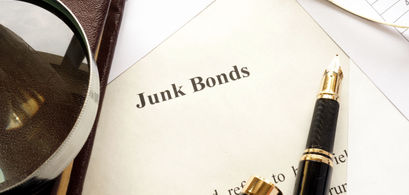Bond investors have a large selection of securities to choose from in the market. One of those options includes high yield debt, more commonly referred to as junk bonds. But as we'll see, the greater returns of these securities are a direct result of their greater risk of default.
In this article, we're going to cover the topic of junk bonds. As part of that discussion, we'll talk about the bond rating system, and its relationship to risk and reward. We'll also see how that rating system can be used to identify high risk securities. Next, we'll talk about the various investment options available to individuals that wish to participate in this market, as well as the best time to buy junk bonds. But first, we'll briefly review the history of these investments.
Investing in Junk Bonds
Also referred to as high yield and speculative grade, junk bonds is the label given to securities that are considered non-investment grade. Throughout the 1970s and 1980s, there was a sharp rise in investor interest in speculative grade offerings. The popularity of these issues is often associated with Michael Milken. While working at Drexel, Milken was both the visionary, as well as a strong proponent, of these "fallen angels" and "rising stars."
Fundamentally, Milken believed that high yield bonds offered investors exceptional value. He argued that because the market ignored the securities of these troubled companies, they offered the investor the opportunity to realize above average returns. Investors, as well as large financial institutions, agreed with Milken's vision and the junk bond market flourished.
Bond Ratings
By definition, junk bonds are non-investment grade. They're considered riskier to own than investment grade securities because the issuing company is experiencing financial challenges. They're either large companies that are suffering financial distress (fallen angels), or start-up companies that are expanding faster than desired (rising stars).
Credit rating agencies are responsible for evaluating a company's risk of default. The bond market relies on the ratings provided by three agencies: Moody's, Standard & Poor's, and Fitch Ratings. The system used by each company to indicate the quality of a company's bond offering appears in the table below.
Bond Rating Grades
Credit Risk | Moody's | Standard and Poor's | Fitch Ratings |
Investment Grade | |||
Highest Quality | Aaa | AAA | AAA |
High Quality | Aa | AA | AA |
Upper Medium | A | A | A |
Medium | Baa | BBB | BBB |
Not Investment Grade | |||
Lower Medium | Ba | BB | BB |
Lower Grade | B | B | B |
Poor Grade | Caa | CCC | CCC |
Speculative | Ca | CC | CC |
No Payments / Bankruptcy | C | D | C |
In Default | C | D | D |
Note to Bond Rating Table: Moody's uses a modifier of 1, 2, or 3 to show relative standing in a category. Standard & Poor's and Fitch Ratings use a modifier of plus or minus.
Bond Yields
As indicated in the table above, ratings assigned by these agencies of Ba, BB, and lower quality would be considered non-investment grade securities. The market price of these bonds would be heavily discounted, and the yields would be well above average.
Our bond yield calculator is able to determine yield to maturity, as well as its current yield value. In fact, only four data elements are needed to calculate these yields: current bond price, par value, coupon rate, and the years until maturity.
For a deeper understanding of the calculation, as well as the importance of this financial measure, there is an entire article dedicated to the topic of bond yields.
Evaluating Bonds
When an investor buys a bond, they're lending money to a company that has promised to pay back the loan at maturity. The ability of the issuing company to repay this debt is reflected in their credit rating.
If a rating indicates the company may have difficulty in repaying that debt, as is the case with high yield bonds, then an investor should carefully consider that possibility. That's why junk bonds are considered speculative, lower quality securities. They are even labeled as such.
Interestingly, the movement of junk bond prices doesn't always follow those of higher-grade securities. While most bond prices usually move in the opposite direction to interest rates, the price of lower quality securities tend to follow economic conditions, just like stocks.
Because the probability of default on a high yield bond increases during a recession, prices of these issues usually decline during rough economic times. On the other hand, when the economy begins to improve, and the risk of default diminishes, the prices of these securities tend to rise. In fact, the best time to invest in junk bonds often coincides with economic upturns.
Buying Junk Bonds
Investors wishing to buy these bonds have several options available to them:
Corporate Issues: it's possible to buy bonds that are issued by a single corporation. Such issues are frequently purchased through brokers.
Mutual Funds: it's also possible to reduce the overall exposure to the default associated with a single company by purchasing shares of high yield mutual funds.
EFTs / Index Funds: finally, there are offerings of exchange traded funds such as iShares iBoxx $ High Yield Corp Bond (HYG) and SPDR Barclays Capital High Yield (JNK).
When evaluating a high yield fund, it's important to understand the fund manager's objective. For example, is the manager investing in near-investment quality bonds, or are they seeking higher yields from more speculative offerings? It's also important to understand how the fund performed during tough economic times relative to its peer group. This information can help the investor to understand how that mutual fund might perform in the future.


